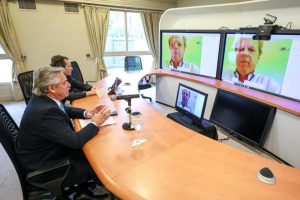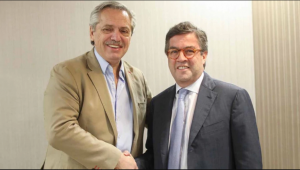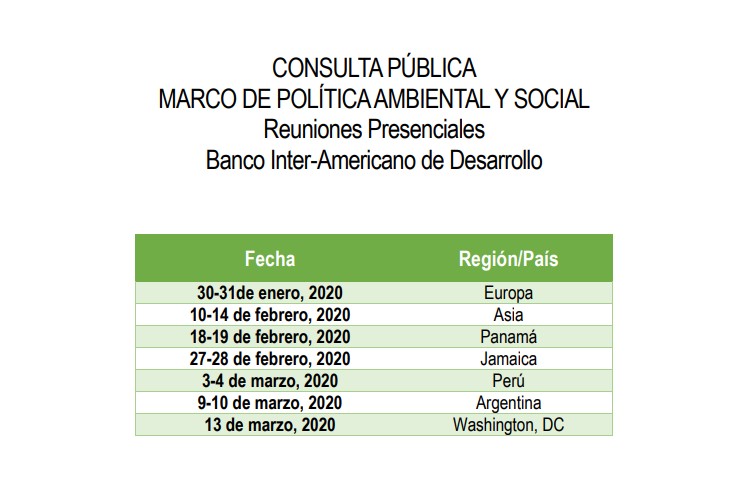In recent weeks, the World Bank approved a project for 35 million dollars and the IDB and CAF have committed amounts of 1,800 and 4,000 million dollars respectively for projects that allow Argentina to face the effects of COVID-19 . These are fast-disbursing loans that, while important to alleviate the economic, social and health consequences of the pandemic, raise a series of doubts regarding the effective fulfillment of the requirements and conditions necessary for their approval.
“Below, we offer a google translate version of the original article in Spanish. This translation may not be accurate but serves as a general presentation of the article. For more accurate information, please switch to the Spanish version of the website. In addition, feel free to directly contact in English the person mentioned at the bottom of this article with regards to this topic”.
The effect of the pandemic on the world economy can be reflected in the paralysis of international trade and economic activities. Furthermore, the situation of uncertainty has led to the tightening of external financing for the States, which at this moment are essential to face the health emergency, which requires heavy investments in materials and specific medical equipment.
Faced with this scenario, various International Financial Institutions such as the World Bank Group, the Inter-American Development Bank -IDB-, the European Investment Bank -BEI- or the Development Bank of Latin America -CAF-, among others, have put Quick disbursement financing available to countries for projects to cope with the effects of the pandemic. On April 2, the World Bank -BM- approved an emergency loan of $ 35 million for Argentina, with the aim of strengthening the health system by purchasing equipment and medical supplies to minimize the impact of the coronavirus on the country. This financing is part of the $ 14 billion fund that the World Bank created to provide assistance to countries that must face the consequences on their health and economic systems due to the outbreak.

Fuente: Página 12
In addition, the World Bank promised to cooperate with the Argentine Republic in the implementation of the Emergency Project for the Prevention and Management of the Disease by COVID-19. The purpose of the same is to strengthen the preparation and response against the pandemic and the adaptation of the country’s national public health systems. The execution of the emergency project will be in two stages: the first consists of the emergency response efforts of COVID-19, which consists of two sub-stages: on the one hand, detection, confirmation, follow-up of contacts, registration and reporting of cases and on the other, the strengthening of health systems. The second stage is the implementation, monitoring and evaluation of the project.
Likewise, on May 7, the Inter-American Development Bank (IDB) announced a loan of 1.8 billion dollars for the country to alleviate the economic, social and health consequences of the COVID-19 crisis. It is the largest amount disbursed by the IDB to Argentina in the last 10 years. The support provided by the IDB is linked to care for the health system, transfer to the social protection network for the most vulnerable, and economic and employment recovery, mainly from micro, small and medium-sized enterprises (MSMEs).

Fuente: Infobae
The programs of the public area of the IDB Group linked to Argentina with the objective of responding to the emergency of COVID-19 and that will be approved this 2020 is 1,000 million dollars, while the other 600 million dollars correspond to current projects.
In an official statement, the Presidency explained that the first of the projects will allocate $ 470 million for a public health program to support the response to the coronavirus, of which 300 million were disbursed this year. The objective is to ensure access to the health system for 17 million people. Similarly, with the intention of supporting the productive sector and promoting job creation, 500 million dollars will be allocated, for which 300 million were disbursed this year. It is estimated that the amount will go to the aid of 30 thousand micros, small and medium-sized companies.
In addition, 600 million will be allocated with the goal of serving the most vulnerable population through a social protection program created in conjunction with the IDB. Of this total, 400 million will be disbursed this year with the purpose of transferring resources and subsidies to vulnerable sectors. It will support around 3 million companies.
For its part, the Development Bank of Latin America (CAF) has stated that in the current context, each State must adopt economic measures that respond to the situation of each country, without neglecting the productive sector and the most vulnerable social sectors. To contribute to these spaces, CAF has deployed an emergency loan package for each country of up to $ 50 billion to serve public health systems; We also allocate emergency disbursements of 2.5 billion dollars per country to SMEs that involve different aspects of the financial portfolio. In addition, non-reimbursable cooperation resources have been made available to donate essential supplies to the health sector.
The Argentine president held talks with the CAF executive (Luis Carranza Ugarte) exchanging concerns and initiatives to respond to the crisis. The institution committed to the Argentine Government to carry out the execution of technical cooperation projects for more than 4,000 million dollars within the next four years aimed at economic reactivation and social aid at different government levels. For the current year, specific financing will be allocated to strengthen the emergency in the provinces ($ 40 million), promote social policies ($ 30 million), develop investments in infrastructure, including educational establishments, repair and construction of routes. , and sanitation (USD 900 million dollars).
In this way, it can be seen that the Financial Institutions have made fast-disbursing funds available to the national government to be able to deal with the effects of the pandemic in an executive manner. And Argentina is not the only case, since more than 130 projects have been approved in countries in Latin America, Europe, Asia and Africa for a total amount greater than 25 billion dollars, according to a mapping of projects carried out by the Early Warning System.
While recognizing the need for countries to quickly have resources to face the economic and social effects of the pandemic, it should be noted that most of these projects are being prepared, discussed and approved in an accelerated manner, in a few weeks, when they are generally processes that take several months since they must go through a series of instances and meet a series of requirements for their approval and start-up. Requirements that not only contemplate economic-financial issues, but also in terms of transparency, public participation, accountability, due diligence and social and environmental sustainability of projects. Therefore, it is questionable whether such requirements are effectively being contemplated and applied in these fast disbursement projects by the Financial Institutions and governments involved.
More information
Authors
- Ailín Toso
- Mariano Camoletto
Contact



